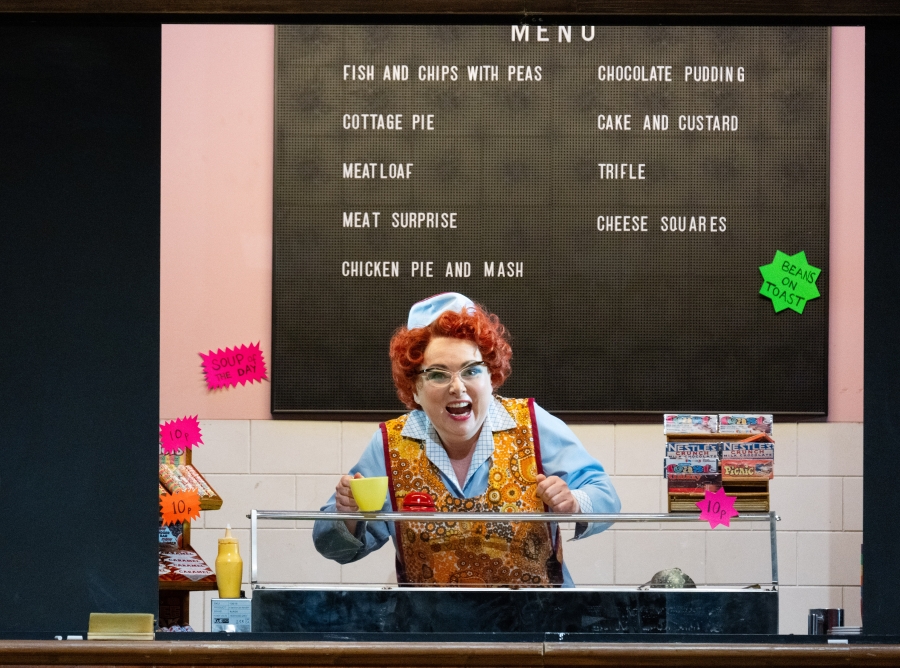
Wales Millennium Centre
***
There are some works which are harder to look at under a modern lens than others, and Così Fan Tutte is certainly one of that number.
To bring to a stage, in 2024, a work that is literally titled ‘they’re all the same’ is inevitably to contend with its glaring sexism, and to try and shoehorn the work into not being sexist is – equally inevitably – to court disaster. This also explains some of the issues that this new WNO production of the Mozart classic is confronted with; some are overcome with grace and good taste, some cause the occasional hiccup.

Kayleigh Decker and Sophie Bevan

Egor Zhuravskii, José Fardilha and James Atkinson

Rebecca Evans
Overall, director Max Hoehn takes the helm of a clever, if not always wholly successful, rethinking of the work which has the great quality of being faithful to the spirit of the original, and of remaining light-hearted and enjoyable as the original was meant to be. The fact that, in spite of its occasionally uncomfortable subject matter, the performance effortlessly managed to elicit frequent bursts of laughter from its audience speaks, perhaps more than any critical note, to its ultimate success.
The hiccups, where they occur, are mostly to do with the process of translating the setting of the opera to a modern one. In the original story, Guglielmo and Fernando are well-to-do army recruits who attend Don Alfonso’s classes in their spare time; this production makes the controversial choice of setting the tale in a Harrow-esque sixth-form college, complete with uniforms and knee-high socks, with Despina in the role of the dinner lady rather than the maid, and the two lovers reappearing disguised as hippies rather than charming foreigners.
The choice of setting is certainly a nod to the full title of the opera (“La scuola degli amanti” means, indeed, “The school for lovers”), but it does cause a cognitive dissonance that is in places hard to shed. There is a feeling that many of the conversations that are being had really require the characters to be older, especially later in the opera as the matter of marriage comes to the forefront and especially since we are setting the story in a modern context; and the overall mood sometimes falters because of it. Likewise, including a number of humorous anatomic diagrams in the set design is in keeping with the overall theme, but occasionally leads to the stage feeling a little overcrowded.
Where this production excels, on the other hand, is in resisting the attempt of adding a moralising frame surrounding the more problematic bits of the libretto. This take on the opera gets the point that the story is to be regarded as being delivered, in its entirety, with tongue firmly planted in cheek. The over-the-top sexism is counterbalanced by the fact that none of the characters come out of this well: not the two male leads, who ultimately lack any resolve in their decision-making, nor Don Alfonso, who comes across bitter in his dogged undermining of their naivety. The audience is meant to be able to laugh at the expense of all of them – no one is spared – in something very similar to what a young contemporary commenter may describe as ‘cringe comedy’. This is something the WNO production fully understands and capitalises on, and what makes the performance easily enjoyable in spite of the length of the work and the lack of famous arias.
Of the vocal performances the stand-out is certainly Sophie Bevan as Fiordiligi; she has some of the most difficult parts – just to name one, the ultimate success of the terzetto she shares with Doralice and Don Alfonso rests on her shoulders, and she delivers unflinchingly – and she matches her impressive technical skills with an animated performance that infuses her character with personality. She has good stage chemistry with Kayleigh Decker’s Dorabella, as the two play out the differences in personality between the two sisters to good comedic effect. James Atkinson as Guglielmo and Egor Zhuravskii as Fernando are both to be praised for their ability to make the two male leads consistently funny, as well as for two solid vocal performances. José Fardilha plays his Don Alfonso cheeky and understated, which works for the character. The real glue of the plot comes from Rebecca Evans’ Despina, who delivers some top-notch acting, making the most of the sections in which she appears in disguise (her bit as the mesmeric doctor is easily one of the stand-out acting performances of the night).
It is not, overall, a perfect result from this production of Così Fan Tutte, but then one has to wonder whether perfection is at all attainable when tackling a work like this. We might do well to remember, looking at the work in its original context, that the intended purpose of an opera like this was first and foremost to amuse, and in this the WNO production is, beyond doubt, successful. Perhaps it is us, the audience, who in the end should resist the temptation to take this opera a little too seriously, and just enjoy the pleasure of going along for the ride.
Touring until May 10
Tour dates, venues and to book: https://wno.org.uk/whats-on/cos%C3%AC-fan-tutte-mozart#venues-and-tickets
Images by Elliott Franks